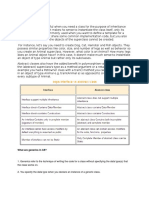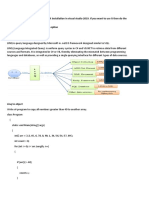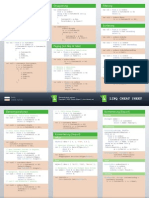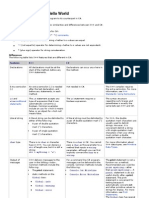C# interface example
1. Let's see the example of interface in C# which has draw() method. Its implementation is
provided by two classes: Rectangle and Circle.
using System;
public interface Drawable
void draw();
public class Rectangle : Drawable
public void draw()
Console.WriteLine("drawing rectangle...");
public class Circle : Drawable
public void draw()
Console.WriteLine("drawing circle...");
public class TestInterface
public static void Main()
Drawable d;
d = new Rectangle();
1
� d.draw();
d = new Circle();
d.draw();
Output:
drawing ractangle...
drawing circle...
2. Implementing an Interface
We cannot create objects of an interface. To use an interface, other classes must implement it. Same
as in C# Inheritance, we use : symbol to implement an interface. For example,
using System;
namespace CsharpInterface {
interface IPolygon {
// method without body
void calculateArea(int l, int b);
class Rectangle : IPolygon {
// implementation of methods inside interface
public void calculateArea(int l, int b) {
int area = l * b;
Console.WriteLine("Area of Rectangle: " + area);
class Program {
static void Main (string [] args) {
Rectangle r1 = new Rectangle();
2
� r1.calculateArea(100, 200);
Output
Area of Rectangle: 20000
In the above example, we have created an interface named IPolygon. The interface contains a
method calculateArea(int a, int b) without implementation.
3. Implementing Multiple Interfaces
Unlike inheritance, a class can implement multiple interfaces. For example,
using System;
namespace CsharpInterface {
interface IPolygon {
// method without body
void calculateArea(int a, int b);
interface IColor {
void getColor();
// implements two interface
class Rectangle : IPolygon, IColor {
// implementation of IPolygon interface
public void calculateArea(int a, int b) {
int area = a * b;
Console.WriteLine("Area of Rectangle: " + area);
// implementation of IColor interface
public void getColor() {
3
� Console.WriteLine("Red Rectangle");
class Program {
static void Main (string [] args) {
Rectangle r1 = new Rectangle();
r1.calculateArea(100, 200);
r1.getColor();
Output
Area of Rectangle: 20000
Red Rectangle
In the above example, we have two interfaces, IPolygon and IColor.
*********************************************************************************
4. Using reference variable of an interface
We can use the reference variable of an interface. For example,
using System;
namespace CsharpInterface {
interface IPolygon {
// method without body
void calculateArea(int l, int b);
class Rectangle : IPolygon {
// implementation of methods inside interface
public void calculateArea(int l, int b) {
4
� int area = l * b;
Console.WriteLine("Area of Rectangle: " + area);
class Program {
static void Main (string [] args) {
// using reference variable of interface
IPolygon r1 = new Rectangle();
r1.calculateArea(100, 200);
Output:
Area of Rectangle: 20000
In the above example, we have created an interface named IPolygon. The interface contains a
method calculateArea(int l, int b) without implementation.
5. Area of Rectangle & Area of Square using interface
using System;
namespace CsharpInterface {
interface IPolygon {
// method without body
void calculateArea();
// implements interface
class Rectangle : IPolygon {
// implementation of IPolygon interface
public void calculateArea() {
5
� int l = 30;
int b = 90;
int area = l * b;
Console.WriteLine("Area of Rectangle: " + area);
class Square : IPolygon {
// implementation of IPolygon interface
public void calculateArea() {
int l = 30;
int area = l * l;
Console.WriteLine("Area of Square: " + area);
class Program {
static void Main (string [] args) {
Rectangle r1 = new Rectangle();
r1.calculateArea();
Square s1 = new Square();
s1.calculateArea();
Output
Area of Rectangle: 2700
Area of Square: 900
6
� 6. Explicit Interface Implementation Example in C#
using System;
namespace AbstractClassMethods
{
class Program
{
static void Main()
{
ImplementationClass obj1 = new ImplementationClass();
//Using obj1 we can call the Add method directly because
//It is implemented using public access specifier
obj1.Add(10, 20);
//We need to typecast obj1 to ITestInterface1 to call the Sub
//method because Sub method is implemented using Interface name
((ITestInterface1)obj1).Sub(100, 20);
//We can call the method directly using the interface reference
//Typecasting is not required in this case
ITestInterface1 obj2 = new ImplementationClass();
obj2.Add(200, 50);
obj2.Sub(200, 50);
Console.ReadKey();
}
}
interface ITestInterface1
{
void Add(int num1, int num2);
void Sub(int num1, int num2);
}
public class ImplementationClass : ITestInterface1
{
//Interface Method Implementation
public void Add(int num1, int num2)
{
Console.WriteLine($"Sum of {num1} and {num2} is {num1 + num2}");
}
//This method purely belongs to ImplementationClass
7
� void ITestInterface1.Sub(int num1, int num2)
{
Console.WriteLine($"Divison of {num1} and {num2} is {num1 - num2}");
}
}
}
Output:
Sum of 10 and 20 is 30
Division of 100 and 20 is 80
Sum of 200 and 50 is 250
Division of 200 and 50 is 150
Declaring Interfaces
Interfaces are declared using the interface keyword. It is similar to class declaration.
Interface statements are public by default. Following is an example of an interface
declaration −
public interface ITransactions {
// interface members
void showTransaction();
double getAmount();
Example
7. The following example demonstrates implementation of the above interface −
using System.Collections.Generic;
using System.Linq;
using System.Text;
using System;
8
�namespace InterfaceApplication {
public interface ITransactions {
// interface members
void showTransaction();
double getAmount();
public class Transaction : ITransactions {
private string tCode;
private string date;
private double amount;
public Transaction() {
tCode = " ";
date = " ";
amount = 0.0;
public Transaction(string c, string d, double a) {
tCode = c;
date = d;
amount = a;
public double getAmount() {
return amount;
public void showTransaction() {
Console.WriteLine("Transaction: {0}", tCode);
9
� Console.WriteLine("Date: {0}", date);
Console.WriteLine("Amount: {0}", getAmount());
class Tester {
static void Main(string[] args) {
Transaction t1 = new Transaction("001", "8/10/2012", 78900.00);
Transaction t2 = new Transaction("002", "9/10/2012", 451900.00);
t1.showTransaction();
t2.showTransaction();
Console.ReadKey();
When the above code is compiled and executed, it produces the following result −
Transaction: 001
Date: 8/10/2012
Amount: 78900
Transaction: 002
Date: 9/10/2012
Amount: 451900
10























































































